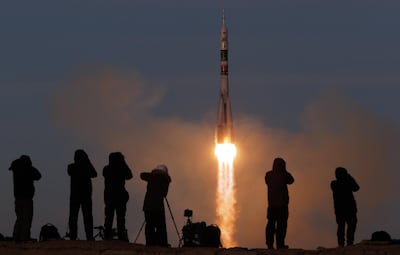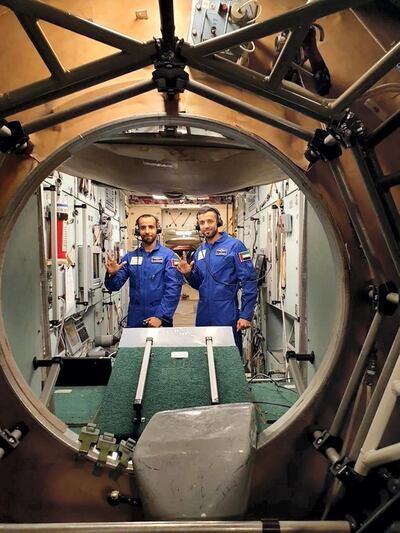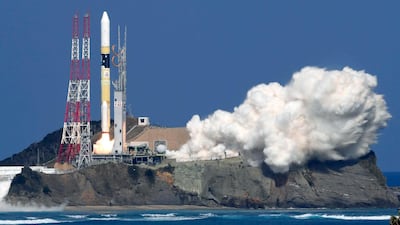If the past year has taught us anything about space exploration it is to expect the unexpected, but also that perseverance pays off.
Without question, the biggest story of 2018 has been the search to find the UAE’s first astronaut to go into orbit in the New Year.
Two satellites were also successfully launched into the skies during a year of impressive progress for the country's endeavours in space.
There has also a little bit of Mars proposed for Dubai, while the vision of Hope, the biggest leap forward so far, continues to draw nearer.
What does it all add up to? That the country is becoming a member of an elite club whose future lies beyond our planet, creating new jobs and technologies but, as important, inspiring its young people with a vision of what they can achieve by looking to the stars.
As Sheikh Mohammed bin Rashid put it in his New Year message: "We've realised early enough that those who won't manage to carve a niche in the space would have no place on earth along with developed nations and peoples.
“Thus, we have incorporated space science into a constant focus of our strategies, and have developed plans and programmes to ensure that our country ushers into the space age,” the Vice President and Ruler of Dubai continued.
Just how committed ordinary Emiratis are to the Ruler’s vision of space was revealed in January in an interview with Dr Mohammed Al Ahbabi, the Director of the UAE Space Agency.
In the few weeks since applications had been invited, over 2,000 had declared their interest in becoming one of the four pioneering members of the the country’s first astronaut corps.
The end of January saw the launch of Al Yah 3, the latest telecommunications satellite from YahSat, the Abu Dhabi-based satellite broadcasting satellite company.
While contact was briefly lost with the the Ariane rocket carrying Al Yah 3 to its geostationary orbit - after the European Space Agency rocket slightly deviated from its path - the precious cargo was safe.
Al Yah 3 was able to manoeuvre to its correct position, where it is now bringing vital internet connections to isolated communities in Africa and South American, among other tasks.
Coming back to Earth - literally - senior officials at the Mohammed bin Rashid Space Centre shared their vision with The National for Mars Science City, an extraordinary project to recreate life in a future colony on the Red Planet, but on the outskirts of Dubai.
The Dh500 million design will consist of huge domes for scientific research that will also allow visitors to experience what it might be like to live on Mars even though they only a short step from Mushrif Park.
________________
Read more:
Taste of life on the Red Planet is coming to Dubai
Sheikh Mohammed: First UAE astronaut is heading to the stars next year
UAE targets mission to Mars following KhalifaSat success
________________
Saeed Al Gergawi, programme director at the Space Centre, said that the extraterrestrial experience would have a strong education theme. “You want to showcase your research. You want to show the world this is what we are doing, this is what we have achieved so far,” he said.
They were achievements that impressed one of the world’s leading space experts, the American astrophysicist Neil deGrasse Tyson.
“You’ve got this right here in this country,” he told the Dubai Government Summit in January. “It's all there. Everything is in place. To bring a force of nature to the next generation.”
By March the number of hopefuls for astronaut training had risen to 3,000 with the task now set of choosing the final fantastic four.
Then, in June, came astonishing news. The first UAE astronaut would take off as soon as next year, revealed Sheikh Mohammed bin Rashid.
A deal had been struck with the Russian space agency Roscosmos to train and fly an Emirati to the International Space Station as early as April 2019.
The pioneering UAE spaceman - or woman - would be part of three crew on a Soyuz rocket, spending up to ten days on board the ISS.
"Our vision to develop the national space sector, which began 12 years ago, is beginning to bear fruit,” Sheikh Mohammed proclaimed on his Twitter feed.
Fewer than 600 people from just 37 countries have been into space. In September, we learned the names of two more.

Sultan Saif Al Neyadi, a doctor of information technology, and Hazza Al Mansouri, a military pilot, were revealed as the first Emiratis to undergo astronaut training by Sheikh Mohammed bin Zayed, the Crown Prince of Abu Dhabi and Deputy Supreme Commander of the UAE Armed Forces.
Al Neyadi, 37, and Al Mansouri, 34, would travel to Russian to begin training almost immediately. One would fly on the Soyuz mission, with the other as back up. The date was set. April 5, 2019.
Then came Autumn, and within a few weeks, stories of a stunning success and possible disappointment.
On October 11, what should have been a routine flight to the ISS came close to disaster when two of the booster stages on a Soyuz rocket collided during separation.
The two man crew of a Russian and an American escaped with no more than a few bruises after a bumpy emergency return to Earth, but the accident saw all Soyuz flights suspended pending a full inquiry. Would this end the hopes of sending an Emirati into space in 2019?

Spirits were lifted with a magnificent achievement in early November. Launched from Japan, KhalifaSat was the first satellite to be designed by Emirati engineers and scientists and to be constructed in the UAE.
The pioneering Earth observation satellite was built in a special clean room at the Mohammed bin Rashid Space Centre, heralding the birth of a new high tech industry for the country.
It is now orbiting the Earth at an altitude of around 600 kilometres. One of its first images was to beam down an high resolution image of a giant portrait of Sheikh Zayed in a Dubai Park, to mark the Year of Zayed and the 47th National Day.
December brought more good news. Russia successfully returned to manned space flight, sending a three man crew to the ISS in a Soyuz launch described by Nasa as “textbook.”
It put the plans for a UAE astronaut back on track, with the head of Roscomos, Dimitry Rogozin, pledging a launch in 2019, although warning it would almost certainly be later in the year because of delays caused by the brief suspension of flights.
That momentous day will be one of the highlights of the coming year. And we can look forward to Hope, or Al Amal, the Mars Mission that will send an orbiting probe to the planet in time for the UAE's 50th anniversary in 2021.
The next 12 months will see work progress at the MBRSC to complete Hope ahead of launch in 2020. It will be the first mission by any Arab or Muslim majority country to Mars, living up to its name as an inspiration to millions in a region where optimism is often in short supply.
So if 2018 saw the UAE go boldly towards where no Emirati has been before, then 2019 looks to be out of this world.


